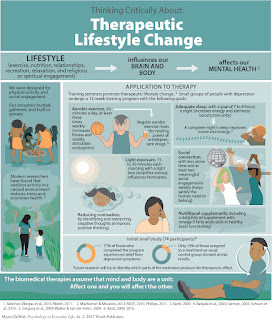This is Part 7 in a series exploring behaviors that increase an individual's sense of well-being. Throughout this series, we will answer the questions:
- What does it truly mean to be happy?
- What are some ways that we can increase happiness?
We will answer these questions through the lens of different "keys" to well-being such as meaning and purpose, flow and peak performance, compassion and empathy, religion and spirituality, stress and coping, physical health, and forgiveness among others. For each topic, we will define what is meant by each "key to well-being," explore the research, and identify specific interventions to increase well-being.
In the previous post, we explored the practice of flow. We learned about ways to increase flow experiences - and that flow might look different for different people at different times! In this post, we are going to switch gears and examine how Therapeutic Lifestyle Changes like diet, exercise, and even spending time in nature, can positively impact well-being.
TLC's - Defined
There are a number of different approaches to the treatment of mental illness. Most treatments can be classified into two broad categories; psychological or biomedical. However, Roger Walsh (UC-Irvine) contends that there is another, often underutilized, treatment option called Therapeutic Lifestyle Changes (TLC's).
According to Walsh (2011), "Health
professionals have significantly underestimated the
importance of lifestyle for mental health. More specifically, mental health professionals have underestimated
the importance of unhealthy lifestyle factors in contributing
to multiple psychopathologies, as well as the importance of
healthy lifestyles for treating multiple psychopathologies,
for fostering psychological and social well-being, and for
preserving and optimizing cognitive capacities and neural
functions."
Let's take a closer look at what these lifestyle changes are and how they can positively impact our health.
Benefits of TLC's
There are a number of advantages to incorporating TLC's into a care plan. First, they are accessible and affordable. Secondly, there are very few side effects. Lastly, they reduce negative psychopathologies and have positive impacts on overall health and well-being. Here are some interesting research findings about the effectiveness of TLC's -
- Regular exercise has been shown to reduce the symptoms of anxiety and depression.
- A "rainbow" diet high in fruits, vegetables, and coldwater fish can reduce symptoms in affective and schizophrenic disorders.
- Spending time in nature can promote cognitive functioning and well-being. It also appears to reduce symptoms of stress, depression, and ADHD.
- Strong social connections can reduce physical and psychological health risks. They are positively correlated with enhanced happiness, improved quality of life, and overall resilience.
- Religious and spiritual involvement that focus on themes such as love and forgiveness can enhance well-being and reduce anxiety, depression, and substance abuse. Want to learn more about the importance of spirituality? Check out this post.
- Acts of service can enhance happiness, metal health, and spiritual maturity while reducing unhealthy qualities like greed, jealousy and egocentrism (Walsh, 2011).
Interventions
One of the best things about TLC's is that they are really easy to implement! Here are some suggestions that can be tailored to your students' interests and needs.
Building Social Capital: Social capital is the sum benefit of our community connections and networks. Social capital seems to be positively related to a wide variety of health measures - including reduced poverty and crime rates - as well as increases in physical and mental health (Walsh, 2011, p. 585).
In the following activity, students will identify the types of social groups that they belong to, identify the psychological and physiological benefits of strong social bonds, measure their current levels of social capital and research ways to increase their current level of social capital.
Nature: Let's be honest. How much time do you spend staring at a screen each day? I am embarrassed to admit that when I looked at how much time I spent on my phone alone it was over 3 hours per day! That is in addition to the time spent on my screen at work - and maybe even a show or two at night. I bet I am not alone!
For this activity, I ask the students to pull their cell phones down, head outside, and spend some time in nature. Spending time in nature has been shown to have the following benefits, it leads to
- Reductions in anxiety, depression, and stress.
- Increases in positive emotions and creative thought.
- Attention restoration
- More prosocial behaviors like helping others. (Suttie, 2016)
In this activity, students will evaluate the impact of technology on their daily lives and participate in a Nature Walk designed to help them reconnect with nature.
I hope that you found this post to be helpful! I would love to hear from you about how you practice TLC's in your own life - or which TLC's you want to build in time for. In the final post in the series, I will address stress and coping strategies. Until then, if you have questions, comments, or resources please drop them in the comments section.
Be Well,
Cori
Other Posts in this Series:
93: Keys to Well-Being: Are You Happy?
94: Keys to Well-Being: What's Your Why?
95: Keys to Well-Being: Got God?
96: Keys to Well-Being: Forgive and Forget?
97: Keys to Well-Being: Are You Kind?
98. Keys to Well-Being: Finding Your Flow
Resources:
Lyubomirsky, S. (2013). The how of happiness: A practical guide to getting the life you want. Piatkus.
Walsh, R. (2011). Lifestyle and mental health. American Psychologist, 66(7), 579–592.https://doi.org/10.1037/a0021769
.jpg)



.png)
Comments
Post a Comment